
Fighters from the Islamic State group parade in Raqqa, north Syria, on June 19,2014. Raqqa Media Office/AP
A Jordanian Man's Journey From the Arab Spring to al-Qaeda Foot Soldier
After pro-democracy protests failed in Jordan, one teenager's determination to make a difference led him into the arms of al-Qaeda in Syria.
AMMAN, Jordan—Umm Jihad’s desktop background is a photo of her son Jihad smiling over his shoulder in a forest, superimposed on a sparkly pastel backdrop. “This was in Syria right before he died,” the 44-year-old mother said (she asked to be referred to as Umm Jihad, or “Mother of Jihad,” rather than by her formal name). Umm Jihad clicked on a folder labeled “Jojo” to show more pictures: Jihad leading a protest for government reform at Amman’s al-Dakhiliya circle; Jihad giving a speech at the University of Jordan; Jihad dressed in white for a pilgrimage to Saudi Arabia; Jihad taking a selfie with his younger brother; Jihad with a full beard, holding a gun, wading through a stream, and waving a black flag inscribed with Jabhat al-Nusra’s white letters: “There is no God but God. Muhammad is the prophet of God.”
The last file in her folder is an amateur diptych, two photos of Jihad in the same pose: sprawled on the floor, chest forward, arms outstretched. On the right, he’s asleep at home on a pile of books and papers, exhausted from studying fortawjihi, the Jordanian college-entrance exam. On the left, blood is pooling from the bullet holes in his bare back. He’s 20 years old, a foreign fighter in Syria, dead.
Jihad Ghaban was one of at least 2,000 Jordanians who have joined factions in the Syrian civil war since it began in 2011, according to analysts’ estimates. As the war enters its fifth year, neighboring Jordan finds itself caught up in the conflict—hosting more than a million refugees from Syria and Iraq while participating in the U.S.-led military coalition against ISIS. Jordan is now the only Arab country left in that coalition.
Still, Jordan’s more acute fight is internal. Its stability is evidence of its strong security, as tightened borders and surveillance prevent Jordanians from joining or forming domestic cells of groups like the Islamic State. And ISIS’s filmed killing of the captured Jordanian pilot Muath al-Kaseasbeh, broadcast in February, helped shift Jordanian public opinion against the Islamic extremist group. But Jordanian opposition to ISIS doesn’t necessarily indicate a broader rejection of militant jihad. Instead, many Jordanians are engaged in a debate about the boundaries and legitimacy of violent extremism.
Umm Jihad’s son left Jordan to fight back in 2013, before the rise of ISIS and subsequent strife between militant jihadist groups in Syria. But the lack of democratic reform after the Arab Spring, along with the spread of religious extremism amid regional instability, continue to undermine many Jordanians’ belief in the country’s political leaders and religious institutions. Interpretation of Islam, and particularly the concept of jihad, is in flux, leaving an exegetical gray zone for passionate, disempowered youth like Jihad Ghaban.
Mo’men Jaabo was 23 when he first met Jihad as a 16-year-old in 2011, the first year of the Arab Spring. Jaabo, who was a schoolteacher at the time, marched next to Jihad through downtown Amman, shouting slogans about freedom and political reform. They used to protest at al-Dakhiliya circle in the daytime, then spend nights writing graffiti in the East Amman neighborhood of Hay Nazzal, where Jihad lived. The neighborhood is poor, conservative, and mostly Palestinian, with a growing Syrian population including older people who fled the Assad government’s Hama massacre in the 1980s and new refugees from the latest conflict. Jaabo showed me a wall bearing Jihad’s handwriting, partially covered over with red paint but still visible: “Why does the king live in a castle while the people die of poverty?”
A few streets away, Jaabo pointed out a large mosque overlooking Hay Nazzal’s main traffic circle. “That’s where Jihad prayed,” Jaabo said, adding that the mosque was well known for Salafi preaching that called for a fundamentalist return to Islam as practiced by the first generations of Muslims. Preachers there interpreted jihad as literal warfare in defense of the Muslim community.
Jihad was an early participant in Herak, Jordan’s largest youth-activist movement. During the Arab Spring, its members protested weekly for democratic change, constitutional reform, and action against corruption. “All the young guys, we were full of hope that we would make lots of changes,” Jaabo said. “We saw the Egyptian revolution, Syria, Tunisia—the governments were scared. We were the strong side.”
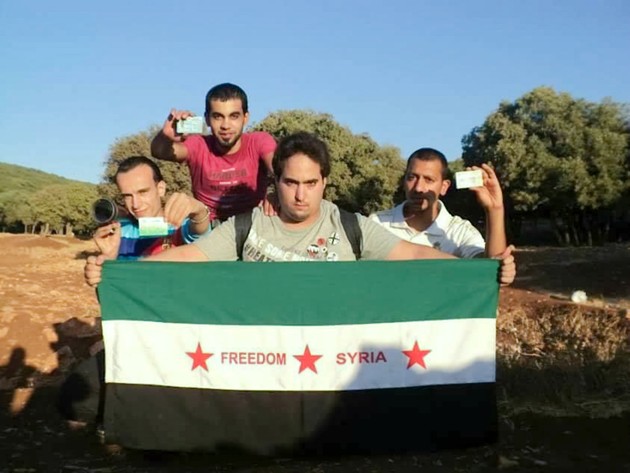
Four years later, the Jordanian government’s promised reform initiatives have largely fallen shortof the activists’ demands. Freedoms of expression and assembly are more limited than before the region’s uprisings, especially with expanded anti-terrorism laws that authorities can use to arrest and try dissidents in military court. Herak still exists, but as the Arab Spring gave way to chaos across the region, many of its most ardent followers became disillusioned, Jihad included.
“When things went down after the first year in Syria, then Libya, we lost hope. It felt like our effort was nonsense,” Jaabo said. “In Jordan, we felt everyone was laughing at the youth. The government and parties were all laughing. Nobody was serious about making reform.”
Jaabo is now 26 and works as the manager of a falafel restaurant. Other Herak members, many from more privileged backgrounds in West Amman, left to study abroad or work in Gulf countries, he said. But Jihad was still a teenager, the son of a factory worker, and struggling to afford his first year of college tuition. Aside from studying, Jihad worked in Jordan’s Sharawi chewing-gum factory. He’d get off work and cross Amman on foot to attend Herak protests, walking for hours because he couldn’t afford taxi fares. His friends nicknamed him Abu Sharawi for the gum he’d pass around every time he arrived.
When Bashar al-Assad’s regime cracked down on Syrian protesters, Umm Jihad said, Jihad spent hours watching Al Jazeera and crying. In the middle of winter, Jaabo said, he and Jihad walked to the Syrian embassy to protest in the snow, waving Free Syria flags to demonstrate Jordanian solidarity against Assad.
As the situation in Syria worsened and Jordan’s activists lost traction, Jihad started thinking about joining the fight. He’d ask his friends what they thought was the best way to help Syrians, said Jihad’s 22-year-old friend Laith Alawneh. “He started thinking that our fight in Jordan is not the priority,” Alawneh said. “There is no bloodshed here, but people in Syria were being killed.” In June 2013, Jihad went on a pilgrimage to Saudi Arabia with a group of young people from his local mosque. When he came back, Umm Jihad said, Jihad told her he wanted to spend a few days in Cairo with friends before returning to school. Jihad flew from Jordan to Egypt to Turkey. After a few days, he called his mother from the Syrian city of Aleppo and told her he’d joined Jabhat al-Nusra.
At the time, ISIS was a fairly low-profile group operating as al-Qaeda in Iraq. In Syria, it had recently announced a short-lived merger with Jabhat al-Nusra, al-Qaeda’s Syrian branch and one of the most prominent rebel groups fighting the Assad regime. Nusra enjoyed considerable popular support. But it had also been designated a terrorist organization by the U.S. government.
During his first year in Syria, Jihad worked for Jabhat al-Nusra’s media office. He had once dreamed of being a journalist; he’d interned at a community radio station in Jordan and filmed youth protests during the Arab Spring. Now he filmed Nusra fighters, spread the footage on social media, and peppered Facebook with increasingly extremist posts.
“Jihad changed then,” Jaabo said. “I couldn’t believe the things he started to say.” In Jordan, Jihad had had friends of all stripes: Muslim Brotherhood supporters, communists, even conservatives who weren’t politically active. He’d swung across the political spectrum, considering joining the Brotherhood, then the leftist parties, but rejecting them all in the end. “The parties can’t criticize the [Jordanian] king because they are part of the system. Jihad wasn’t satisfied with this,” Jaabo said. “He’d rather be independent than compromise.”
Jihad was religious before going to Syria, his friends and family said, but not radical. “He loved Islam,” said Alawneh, Jihad’s leftist friend. “But he was also talking to girls and going out. He wasn’t strict at all.”
After Jihad went to Syria, he changed his Facebook profile photo from the Free Syria flag to the Jabhat al-Nusra flag. His purist tendencies took a religious bent, manifesting in his Facebook declarations that communists were kuffar, or infidels, and had to be killed. Did that mean, Jihad’s friends in Jordan wondered, that he would fight them if they were in Syria? Jihad was getting caught in an ideological and religious war, his friends told him, not a freedom fight. “Still he didn’t change his mind,” Jaabo said.
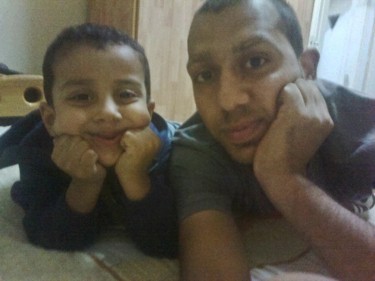
“He’d tell us, ‘You’re not helping people. You’re in the house while people are suffering,’” said Jihad’s Syrian childhood friend Mulham al-Ahdab. He thought Jihad was being abrasive on Facebook, but then again, Syria was burning. At least Jihad was doing something. “I hate this world that stays silent while young guys like Jihad sacrifice themselves,” Ahdab said. “We all still loved him.”
Eventually, Jihad took up arms for Nusra. In October 2014, one year and four months after entering Syria, he was shot by Syrian government forces and killed.
From the Jordanian government’s perspective, combating extremism requires a combination of security policy—guarding the country’s borders to prevent fighters from flowing in or out of the Kingdom—and ideological persuasion. “Our strategy is to secure people’s way of thinking,” said the Ministry of the Interior spokesperson Ziad al-Zoubi. “We must support moderate ideologies before extremist ones become popular.” Jordanian authorities attempt to do so by holding dialogues and workshops with youth via civil-society organizations, Zoubi said, and by promoting moderate Islam through the Ministry of Awqaf and Islamic Affairs, the government entity that manages Islamic property.
Ashraf al-Kilani, the director of the Jordanian civil-society organization Friends of National Security, said his organization recruits religious leaders, often from the state institution Dar al-Ifta, to engage young people in dissecting ISIS material and to point out why the group’s interpretation of Islam is wrong. Sometimes participants are then brought to the King Abdullah Special Operations Training Center (KASOTC), a military training ground in the desert outside Amman, where they meet with officials from the public-security directorate.
“The youth are happy to have real talk with us and to meet with security officials,” Kilani said, adding that many request photos with the KASOTC officers. “We as Jordanians really adore the army, the security forces, and the king.”
On the religious side, Minister of Awqaf and Islamic Affairs Hayel Daoud said that there are 6,300 mosques in Jordan delivering some 5,000 Friday sermons every week. The country’s mosques are all overseen by the government, Daoud added, so every message preached on Fridays should adhere to an Awqaf-approved version of moderate Islam. “We want them to talk about mutual topics that everyone agrees on, not anything that causes division,” Daoud said. “We want topics that encourage people to live in unity and peace.” Fifty ministry employees monitor the mosques and report any preachers who stray from approved content. Since the Muath al-Kaseasbeh video in February, Daoud said, the ministry has relieved 50 preachers of their duties.
But critics say the Jordanian government’s attempts to control the religious sphere have had a limited impact, if any at all. “I’ve never met anyone who changed his mind from extremist ideas because of someone from the Awqaf,” said the Amman-based Islamist expert Hassan Abu Hanieh. Official religious institutions lack credibility among the people, he said, because they’re seen as part of the political system. At the University of Jordan, Alawneh laughed at the idea that government monitoring could stop extremist ideas. “Awqaf stopped 50 people who support extremist ideas in the whole country?” he said. “Go walk on our campus for 10 minutes and I’ll find you 50 more.”
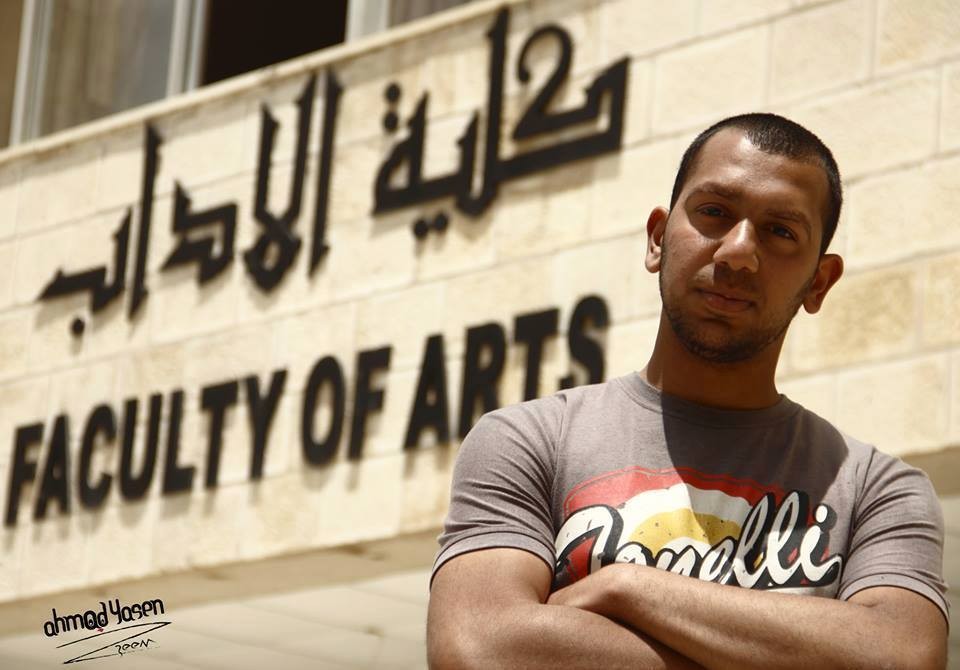
Jihad Ghaban as a freshman at the University of Jordan (Umm Jihad)
Fewer Jordanian youth are going to fight in Syria now than when Jihad went, Alawneh observed, but that’s not necessarily because the government has changed young people’s minds about the merits of jihad. The interpretation of jihad, a duty to literally “struggle” for Islam, is disputed. Some Muslims understand the struggle as spiritual and internal; others speak in terms of social justice, of educational, missionary, intellectual, or economic endeavor; and still others of holy warfare.
“When Jihad died, all these Salafi guys were making speeches at his wake, saying how he was brave and martyred,” Jaabo said. “Nowadays the situation is very different with Daesh [an Arabic term for ISIS], but even so, people believe in the war in Syria. There’s no problem [with most Jordanians] if anyone goes to fight.”
A university memorial service for Jihad was filled with youth who supported Jihad’s decision to go to Syria, according to Alawneh. “They were all praying for God to take revenge on the Shi’a and help the mujahideen,” Alawneh said, referring to Sunni rebel groups fighting the Shiite Assad regime. The reasons young people aren’t crossing the border to fight these days are often not ideological but practical: tightened security, no way of returning to Jordan, and reservations about the chaos and uncertainty in Syria.
“Jihad was brave. We are weak,” said Ahdab, explaining why he didn’t go to Syria as well. “We are creating different excuses for ourselves, but in the end we know that he is a hero and that he did the right thing.”
Alawneh, for his part, believes waging war in Syria isn’t the best way to help the Syrian people. “Syria is a game. You have the Saudis, Turkey, Iran, America, Qatar—why would I let myself be an instrument in the hands of these people?” he said. Young fighters on every side are being manipulated in a cycle of weapons, blood, and money that only advances the political interests of the big powers, Alawneh added. “I wouldn’t join the Jordanian army and become a tool for America either.”
Nasser Abu Abdulrahman, a 48-year-old Salafi sheikh from the conservative Jordanian town of Rusaifeh, said he wouldn’t encourage the younger generation to fight in Syria—not because doing so conflicted with his interpretation of jihad in Islam, but because of the split between jihadist groups there. “This is a time offitnah [infighting and division among Muslims]. The mujahideen are split,” Abu Abdulrahman said, referring to the schism between ISIS and Jabhat al-Nusra that first developed in the summer of 2013. It’s better for Jordanians to stay home for now, Abu Abdulrahman said, rather than exacerbate internal Islamic disunity by joining factions that are battling one another.
Abu Abdulrahman characterized ISIS as an overly zealous group that had made serious mistakes in ideology and action, particularly in burning to death Muath al-Kaseasbeh. “But no one says that Daesh is not Muslim. We don’t call them infidels,” he said. Even if the Islamic State employs illegitimate methods of Quranic exegesis, he added, people will support the Sunni group out of desperation amid war, oppression, and suffering. “If a drunk man protects your son from being raped, you will defend [the drunk man]. He is better than others because he protected your son,” Abu Abdulrahman explained. Likewise, people suffering in Syria and Iraq, especially Sunnis, will overlook ISIS’s theological illegitimacy to support its military success, especially given the seeming lack of international will to end Syria’s war.
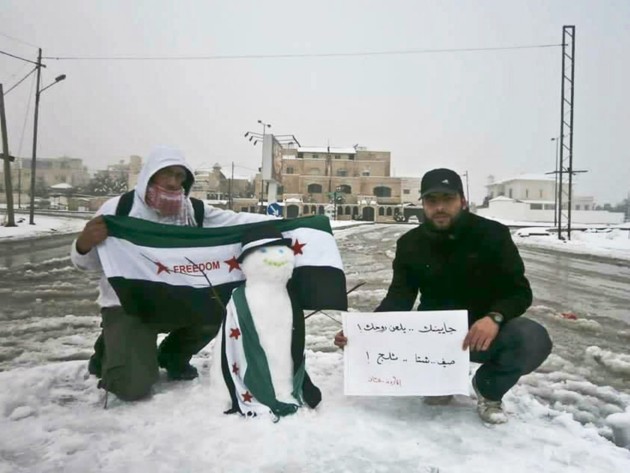
Jihad Ghaban (left) and Mo’men Jaabo protest against the Syrian regime at the Syrian embassy in Amman. (Mo’men Jaabo)
According to his friends, Jihad was driven to join Nusra for many of those same reasons: intolerance of injustice, frustration with international inaction, and a determination to make a difference. “Jihad was the Arab Spring personified. He wasn’t a spectator,” said Ahdab.
“Jihad was like a white page that anyone could write on. It was easy to affect him because he was so passionate,” Alawneh noted. He had argued with Jihad about the legitimacy of extremist religious ideology. But bring up the chemical-weapons attacks, dying children, and raped women in Syria, and Jihad would cry.
“Jihad had fire in his chest,” Umm Jihad said. She recalled the time she and Jihad passed a man beating his donkey on the street. Her son stopped and rebuked the man even though Umm Jihad insisted it was none of their business. “If that’s how he cared about donkeys, what about Syria?” she mused. “Jihad was tired from Jordan and the government. He was always talking and no one listened to him. He wanted action, not words.” Jihad went to Syria to die, Umm Jihad said, and she had no choice but to accept it.
On the streets of Amman, bold signs in patriotic red, green, and black declare, “Raise your head, you are Jordanian.” The state’s message is clear: Jordan is one; Jordan is strong; Jordan is proud to stand against the terrorists.
The death of the pilot Muath al-Kaseasbeh has made this government message more of a reality, according to a recent survey by the Center for Strategic Studies (CSS) at the University of Jordan. In December 2014, 72 percent of respondents considered ISIS a terrorist group; in February 2015, after video of the Islamic State burning the pilot came out, that number went up to 95 percent. Meanwhile, 37 percent of respondents considered Jabhat al-Nusra a terrorist organization in December 2014 compared with 55 percent in February 2015 and 62 percent in April 2015. “Kaseasbeh changed one-fifth of the population’s opinion in two weeks,” said Walid al-Khatib, CSS’s head of public-opinion polls and surveys. “That’s more than what the government did after campaigning against ISIS for four months.”
Still, the best way to describe how many Jordanians view Islamic extremist groups is in shades of gray, according to Khatib. “There is an extremely thin line between being a very good Muslim who follows the prophet’s rules and becoming extremist,” he explained. The government may try to convince people that it knows where these lines are, but state-affiliated voices lack legitimacy on the Jordanian street. “The government places its personal interests above religious correctness,” Abu Abdulrahman said.
While Jordanians often trust and depend on the government to preserve national security, they are not so quick to believe its opinions on God’s will. Umm Jihad, for example, doesn’t have faith in official talk about nonviolent jihad. “Look at how barrel bombs are destroying hospitals in Syria. Look at how Muslims are being killed in Burma. Isn’t this injustice?” she asked. “Our religion is clear. If a Muslim needs help, you must go and fight for them.”
At the same time, Umm Jihad hadn’t known Jihad was going to Syria, nor was she able to make him come back. “I want to tell you I believe he made the right decision,” she said. She’d cried and begged her son to return every time he called, despite believing that jihad is a duty and that her son’s motives were pure. “Those without much faith will say, ‘Stay here with me and don’t go.’ She with strong faith will tell her son, ‘You must go and fight,’” Umm Jihad said. “But as a mother, this is difficult. This is right, but difficult.”
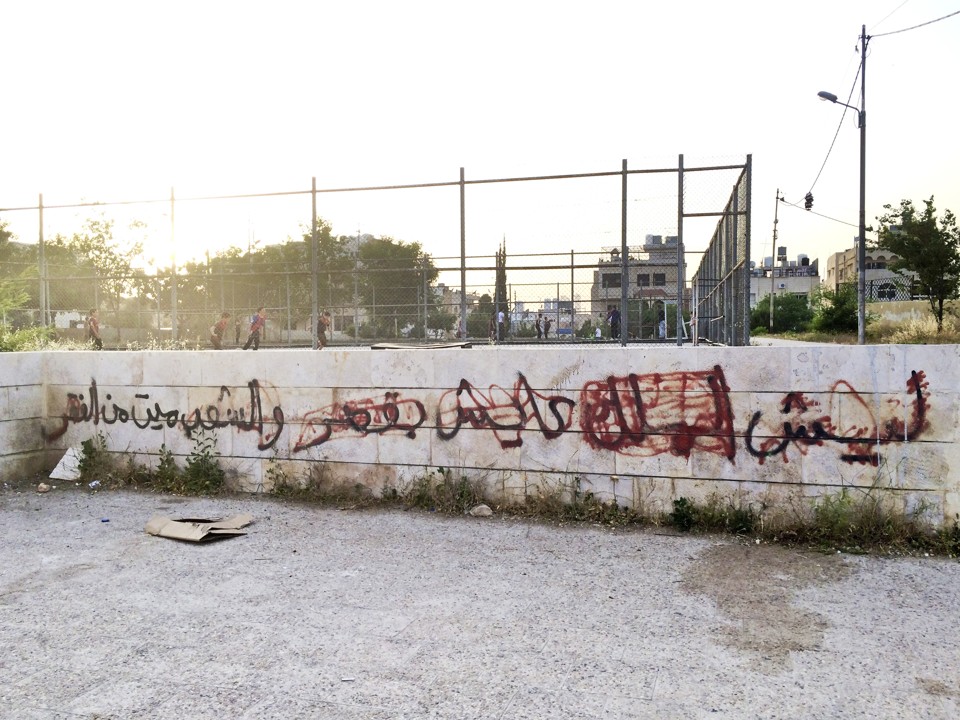
Graffiti scrawled by Jihad Ghaban in his neighborhood reads, “Why does the king live in a castle while the people die of poverty?” (Alice Su)
The real conversations in Jordan on religion and the nature of jihad are happening not at state-sponsored dialogue sessions, but on the Internet and social media, according to Abu Hanieh, the expert on Islamism. He opened Facebook as an example, scrolling down his news feed through an endless stream of posts: a video message from extremists establishing the “state of Sinai,” a photo of the Islamic State creating roads in the Sinjar Mountains in Iraqi Kurdistan, congratulations for the ISIS victory in the Iraqi city of Ramadi, condemnation of Muslims being burned in Burma, and so on. “If the state wanted to silence the jihadis, they’d have to silence everyone,” Abu Hanieh said.
Abu Hanieh noted that after the release of the Kaseasbeh video, he didn’t see many Jordanians rejecting extremist groups outright; instead, he witnessed Jordanians discussing nuanced questions about the permissibility of burning as a punishment in Islam. “The ideology of extremism has become more flexible,” Abu Hanieh said. “People are thinking about jihad more than before, and the discussions are loud, passionate, and spreading.”
If the Jordanian government can’t fight extremism through ideological control, what can it do? The opposite, Abu Hanieh suggested: democratic reform and political opening. “Jordan is moving away from democracy in the name of combating extremism,” he said, citing state crackdowns on communists, Herak, and the Jordanian wing of the Muslim Brotherhood. “If you let the moderates back into the light, that will push the extremists to the margin.” Jihad’s friends agreed. “We need bread, freedom, and social justice,” Alawneh said.
As a 16-year-old, Jihad had once demanded those exact things. “Jihad cared so much, but he felt like nobody was listening in Jordan,” Jaabo said. “If he had found real reform here, I think he never would have gone.”
Reporting for this article was supported by the Pulitzer Center on Crisis Reporting.



